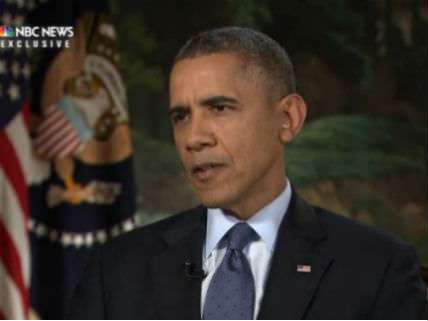Could Obama's Unlimited Faith in Himself Explain His Sudden Loss of Interest in Protecting Americans' Privacy?

In anticipation of President Obama's speech tomorrow on the federal government's surveillance programs, a front-page story in today's New York Times considers how his views on the subject have changed since he was elected. While running for the Senate in 2004, Peter Baker notes, Obama condemned the PATRIOT Act for "violating our fundamental notions of privacy," declaring that "we don't like federal agents poking around our libraries." As a senator in 2005, Obama continued to criticize the PATRIOT Act and sponsored a bill aimed at raising the standard for using national security letters to obtain business records. As a candidate for the Democratic presidential nomination in 2007, he gave a speech promising that in his administration there would be "no more illegal wiretapping of American citizens" and "no more national security letters to spy on citizens who are not suspected of a crime." After he had secured the Democratic nomination, however, Obama voted for a bill that retroactively validated George W. Bush's illegal wiretapping and gave the same practices statutory cover going forward. And once he took up residence in the White House, all his previous concerns about the threat to privacy posed by the national security state seemed to disappear.
Why? The more charitable explanation suggested by Baker is that Obama suddenly realized that the national security state is all about protecting national security. His first inkling of this came in the form of "a supposed plot by Somali extremists to attack the [inauguration] ceremony." You might think the fact that the plot proved to be bogus would reinforce Obama's avowed skepticism about the powers exercised in the name of fighting terrorism. But evidently he focused instead on the fact that the erroneous warning involved a threat to his own presidential person. He displayed a similar narcissism in response to Edward Snowden's revelations about NSA surveillance. The one thing that really upset Obama, Baker says, was learning that "the mobile phone of Chancellor Angela Merkel of Germany was being tapped." Since she is a fellow head of state, I'm guessing, Obama can empathize with her. The rest of us, not so much.
The less charitable (and more plausible) explanation for Obama's sudden loss of interest in protecting Americans' privacy also fits this portrait of him as a man very much impressed by himself. "He trusts himself to use these powers more than he did the Bush administration," observes Juan C. Zarate, who advised Bush on counterterrorism policy. In case you think that Zarate's evaluation is tainted by partisan considerations, Baker cites Obama's own advisers as reporting that Obama "was surprised at the uproar" provoked by Snowden's revelations. "particularly that so many Americans did not trust him." And here is one of the people Obama chose to serve on the advisory panel he appointed after he realized that people really were upset about what he had described as a "modest encroachment" that "the American people should feel comfortable about":
"The point we made to him was, 'We're not really concerned about you, Barack, but God forbid some other guy's in the office five years from now and there's another 9/11,'" said Richard A. Clarke, a former White House counterterrorism adviser who served on the panel. He had to "lay down some roadblocks in addition to what we have now so that once you're gone it'll be harder" to abuse spying abilities.
In other words, Obama, convinced of his own benevolence and infallibility, has no qualms about wielding these powers. But the thought that a Republican might one day wield them (which evidently had never occurred to him before) does give him pause. (On The Independents recently, a conservative panelist expressed exactly the opposite view: that Bush could be trusted with these powers, but not Obama.) Obama's unlimited faith in himself clearly colors the way he analyzes the questions raised by the NSA's snooping:
Benjamin J. Rhodes, a deputy national security adviser working on Friday's speech, said Mr. Obama saw the issue as two separate questions—abuse of government power and extent of government power.
Many of us who are not the president would suggest that limiting the extent of government power is the most effective way to prevent its abuse, precisely because of its tendency to corrupt those who wield it.


Show Comments (120)